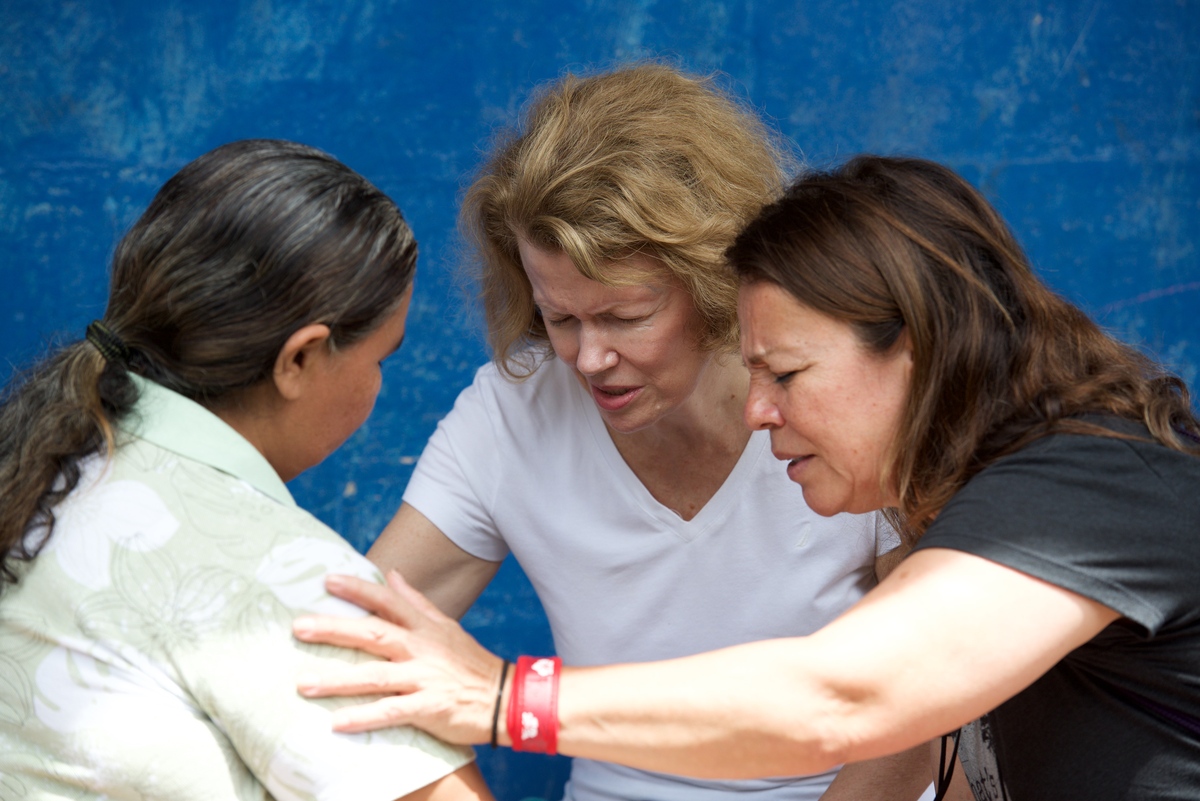Roma Revival
EuropeA dirty creek, with mounds of garbage on both sides, slices through the middle of the half-mile long town square. A small 15-foot bridge over the creek connects each side of the square. On the right are the shanties — makeshift homes of tin and other scrap material — often rotted and rusted. These structures are home to 7,000 people. There is less than a foot of space between the homes, some even share a wall. There is no privacy; everyone can hear one another’s household affairs.
Throughout the village lie random piles of garbage. There is limited pavement and inches of mud to trudge through. Almost every surface is covered in filth. An alley behind the shacks is the garbage dump where people discard their household waste. The smell is putrid because of the garbage, rot, burning rubber, and toxins.
The area’s overpopulation makes walking or driving difficult. People are walking, playing, and working throughout the streets. Stray dogs run around barking. This is Slovakia’s largest Roma settlement.
Throughout Europe, people look down on the Roma. Some believe because the Roma live in extreme poverty, they have nothing to contribute to society. The physical, social, and economic hardships in Roma communities are often perpetuated by negative stereotypes, causing additional challenges and misdirected notions. Beyond false perceptions however, are sweet, community-oriented people, loved by God and ready to receive the gospel.
God has brought a marginalized, oppressed, and impoverished people into a 24-year long revival. For years there has been an intense spiritual hunger. The Lord is igniting the hearts of the Roma for His name. Entire villages are turning to Jesus and commissioning pastors to bring the gospel to other Roma communities. The gospel is spreading rapidly. While most of Roma have settled in communities, some still live nomadic lifestyles. Migrants often move to other countries for better living conditions and job opportunities, with some also sharing the gospel by starting cell groups and churches within their communities.
Many Roma are eager to receive the gospel. “When you’re so poor, you have nothing else. You’ve tried gambling, you’ve tried drinking, you’ve tried partying, you’ve tried immorality. There’s no hope. The government is not offering much hope. There comes a time where you have nothing else to do but turn to God,” remarks John Bean, Assemblies of God World Missions global worker to Slovakia.
John and Daralena Bean first began their ministry journey in 1992 as Assemblies of God church planters in Springfield, Missouri. In 2001, John went on his first mission trip to Eastern Germany. Three years later, the Lord spoke to him in a dream where he saw the church he preached in during the mission trip. The Lord told him, “These people are hungry for more and to know more truth.” During seminary, John took a cross-cultural communication class that required him to research a culture. John chose Germany. His heart broke as learned more about the people of Central Europe.
In 2007, John’s brother asked John to join him on a mission trip to the Czech Republic. Although he was in the middle of seminary, John decided to go. God spoke to him again, “This is it. This is the part of the world I want you to come to.” That same year, after a long-held burden for the people of Central Europe, AGWM approved John, Daralena and their 5 children as missionaries to Slovakia. Since then, they have partnered with God and Roma pastors to transform a primarily agnostic culture into a people for Jesus.
Shortly after he arrived in Slovakia, John travelled to the eastern portion of the country for a conference. At this conference, John met Roma people for the first time. “As soon as I met them and saw their needs and saw their plight and saw that their situations, I knew why God called us to Slovakia. There’s something just connected in my heart that this is where God’s calling us,” says John.
Now, after 16 years in missions, God continues to work through the Beans. Roma adults are in tears as they hear the hope of the gospel for the first time. God is using the Roma to evangelize other Roma by sharing their newfound hope and salvation in Jesus. Roma churches are engaging in outreaches and reaching hundreds in their community. Roma pastors are planting churches and birthing small groups. The gospel is rapidly expanding in these communities. It is the Roma’s time.
Roma churches are indigenous — led by a Roma pastor — to reach more Roma people. “Some of our pastors used to beat their wives, they were alcoholics, they partied. Now, they’re pastoring 300 to 400 people. There are so many testimonies of God’s transforming grace in these people’s lives,” says John.
With the rapid expansion of the gospel, the Roma urgently need trained pastors, teachers, and evangelists. Many indigenous pastors who shepherd the Roma churches must preach in every service, in small groups, and at outreach event in addition to pastoral care. Most Roma pastors are self-taught. Although many of these pastors have a limited formal education, it does not hinder their growth in the knowledge of the Word. God continues to use Roma pastors to reach their people with the gospel.
Romani churches, ranging from 100-300 members, often lack children’s, youth, and women’s ministry. John and Daralena Bean recently moved to the Eastern portion of Slovakia to help transform Roma churches by reaching areas that have been overlooked due to rapid expansion. The Bean’s pastoral hearts have created a desire to help Roma pastors by preaching, assisting in outreaches, and developing programs for kids, youth, and women. Many Roma churches lack a consistent women’s ministry. A youth group or youth service and children’s ministry tends to be the lowest priority. The Beans are launching these new ministries in 13 local churches across Eastern Slovakia. They are supporting the local ministers by preaching, ministering, fundraising, building churches, and creating and sustaining new ministries to help transform Roma communities one by one.
After noticing the destructive path of many Roma youth, the Beans realized that if the Roma culture of alcoholism, drug addiction, stealing, and violence was to shift, the shift needed to begin with the youth. The Beans have conducted a youth camp for the Romani for the past 10 years. The camp includes morning and evening services, prayer time, and recreation. The four-day camp is a spiritual and relational marker for many of those who attend. After services, the youth gather around pianos and guitars, singing and enjoying music. “They love church. That’s all they have. They don’t have soccer tournaments, they don’t have gymnasiums, they don’t have playgrounds. Most of their villages are just shacks. When they give their heart to the Lord, church is their thing,” says John. The gospel is transforming Roma youth from criminal activity and illegal substances to Jesus.
The revival the Romani are experiencing is not exclusive to Slovakia. The gospel is spreading like wildfire throughout Roma villages and into other countries. Places like Serbia, Moldova, Macedonia, and Bosnia are also seeing Roma villages receive salvation. Believers there are establishing house churches and small groups as well. In fact, many Roma churches are now numerically similar to national churches in England, Belgium, and Germany.
God is working among the Roma. He is making himself known to an agnostic, spiritual people and transforming the deeds of darkness with His redeeming light. He is using former criminals, abusers, and alcoholics to preach liberty to those still in captivity. He is liberating generational curses of spiritual poverty, hopelessness, despair, and disorder. He is restoring people, one by one, community by community and transforming them into powerful evangelists, pastors, and ministry leaders.
Despite the rapid growth and expansion of new ministries, there are still Roma villages throughout Slovakia that are closed to the gospel or any outside influence. Roma villages can be dangerous places without an internal connection to the community. Often, it takes one Roma to provide a pastor or evangelist access to a village. If one person accepts the gospel and accompanies a pastor into the village, it provides access to the entire village. “We pray that places that have never had access that we’ll be able to give them that access,” says John.
Although there has been a great harvest among the Roma, there is still an immense spiritual and physical need. Currently, the Beans are the only AGWM missionaries in Slovakia but the Lord is sending laborers. John and Daralena’s youngest daughter and her Roma husband are applying to missions with the hopes of serving the Roma people in Eastern Slovakia and carrying on the Bean’s legacy.
As God continues to move throughout Europe, pray for Roma pastors who are faithfully serving their communities. Pray that those in poverty will hear about the riches of Christ, pray for His hope to come to the hopeless, and pray that the gospel will expand to Roma villages that have yet to be reached.
By Holly A.V. Knapp






















